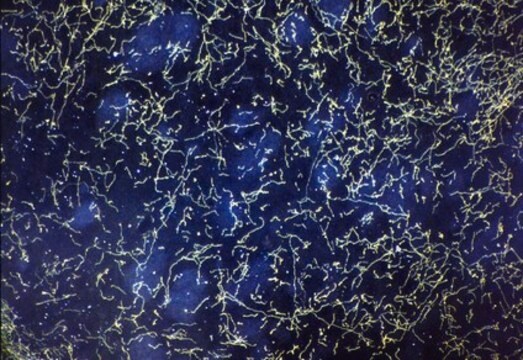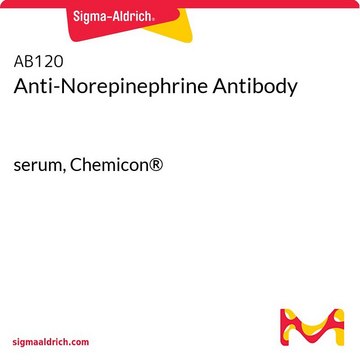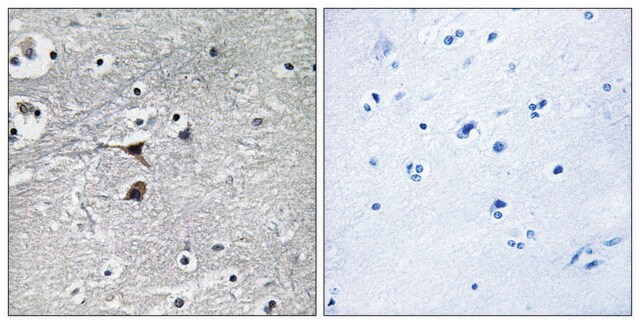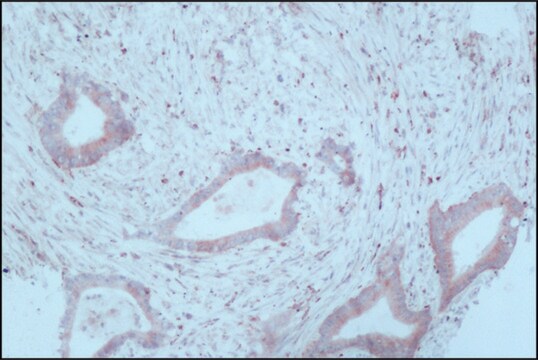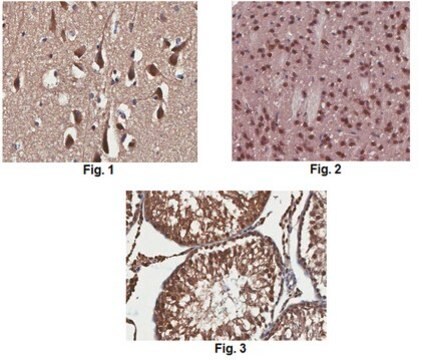AB125
Anti-Serotonin Antibody
serum, Chemicon®
Synonim(y):
5-HT
Zaloguj sięWyświetlanie cen organizacyjnych i kontraktowych
About This Item
Kod UNSPSC:
12352203
eCl@ss:
32160702
NACRES:
NA.41
Polecane produkty
pochodzenie biologiczne
rabbit
Poziom jakości
forma przeciwciała
serum
rodzaj przeciwciała
primary antibodies
klon
polyclonal
reaktywność gatunkowa
rat
producent / nazwa handlowa
Chemicon®
metody
immunohistochemistry: suitable
Warunki transportu
dry ice
docelowa modyfikacja potranslacyjna
unmodified
Specyficzność
Serotonin (5-Hydroxytryptamine)
The cross-reactivities were determined using an ELISA test by competition experiments with the following compounds:
Compound Cross-reactivity
5-Hydroxytryptamine-G-PL 1
5-Methoxytryptamine-G-PL 1/25
Tryptamine-G-PL 1/60
5-Hydroxytryptophan-G-PL 1/175
5-Hydroxytryptamine 1/1150
Tryptophan-G-PL 1/3400
5-Methoxytryptophan-G-PL 1/19800
The antisera was also tested for specificity using the free-floating PAP technique on rat
raphe nuclei.
Abbreviations:
(G) Glutaraldehyde
(=) Non-reduced conjugate
(PL) Poly-lysine
The cross-reactivities were determined using an ELISA test by competition experiments with the following compounds:
Compound Cross-reactivity
5-Hydroxytryptamine-G-PL 1
5-Methoxytryptamine-G-PL 1/25
Tryptamine-G-PL 1/60
5-Hydroxytryptophan-G-PL 1/175
5-Hydroxytryptamine 1/1150
Tryptophan-G-PL 1/3400
5-Methoxytryptophan-G-PL 1/19800
The antisera was also tested for specificity using the free-floating PAP technique on rat
raphe nuclei.
Abbreviations:
(G) Glutaraldehyde
(=) Non-reduced conjugate
(PL) Poly-lysine
Immunogen
5-Hydroxytryptamine-glutaraldehyde-Poly-lysine
Zastosowanie
Anti-Serotonin Antibody detects level of Serotonin & has been published & validated for use in IH.
Immunohistochemistry: 1:1,000-1:2,500 by ABC or enhanced detection. Glutaraldehyde fixation is required. Antibody will not react with non-glutaraldehyde treated tissues. Blocking should be with serum or BSA containing 0.1-0.2% triton X-100; remove all blocking an detergents during primary antibody incubation. Dilute only in PBS or TBS for best results. For fluorescent detection antibody dilution must be reduced, but it is not recommended because of glutaraldehyde autofluorescence.
Optimal working dilutions must be determined by the end user.
Optimal working dilutions must be determined by the end user.
Research Category
Neuroscience
Neuroscience
Research Sub Category
Neurotransmitters & Receptors
Neurotransmitters & Receptors
Postać fizyczna
Rabbit antiserum. Liquid with 0.05% sodium azide.
Przechowywanie i stabilność
Maintain at -20°C in undiluted aliquots for up to 6 months after date of receipt. Avoid repeated freeze/thaw cycles.
Informacje prawne
CHEMICON is a registered trademark of Merck KGaA, Darmstadt, Germany
Oświadczenie o zrzeczeniu się odpowiedzialności
Unless otherwise stated in our catalog or other company documentation accompanying the product(s), our products are intended for research use only and are not to be used for any other purpose, which includes but is not limited to, unauthorized commercial uses, in vitro diagnostic uses, ex vivo or in vivo therapeutic uses or any type of consumption or application to humans or animals.
This page may contain text that has been machine translated.
Nie możesz znaleźć właściwego produktu?
Wypróbuj nasz Narzędzie selektora produktów.
Kod klasy składowania
10 - Combustible liquids
Klasa zagrożenia wodnego (WGK)
WGK 2
Temperatura zapłonu (°F)
Not applicable
Temperatura zapłonu (°C)
Not applicable
Certyfikaty analizy (CoA)
Poszukaj Certyfikaty analizy (CoA), wpisując numer partii/serii produktów. Numery serii i partii można znaleźć na etykiecie produktu po słowach „seria” lub „partia”.
Masz już ten produkt?
Dokumenty związane z niedawno zakupionymi produktami zostały zamieszczone w Bibliotece dokumentów.
Serotonin-like immunoreactivity in Merkel cells and their afferent neurons in touch domes from the hairy skin of rats.
K B English, Z Z Wang, N Stayner, L J Stensaas, H Martin, R P Tuckett
The Anatomical Record null
Z Z Wang et al.
Neuroscience, 47(2), 473-480 (1992-01-01)
The mammalian carotid body consists of preneural type I (glomus) cells synaptically coupled to afferent axon terminals and enveloped by type II (sustentacular) cells. Recent studies indicate the presence of multiple putative neurotransmitters in this arterial chemoreceptor organ. A double-labeling
Time-course gait analysis of hemiparkinsonian rats following 6-hydroxydopamine lesion.
Hsieh TH, Chen JJ, Chen LH, Chiang PT, Lee HY
Behavioural Brain Research null
The chemical code of porcine enteric neurons and the number of enteric glial cells are altered by dietary probiotics.
A di Giancamillo,F Vitari,G Bosi,G Savoini,C Domeneghini
Neurogastroenterology and Motility null
A new tumorsphere culture condition restores potentials of self-renewal and metastasis of primary neuroblastoma in a mouse neuroblastoma model.
Cao, D; Kishida, S; Huang, P; Mu, P; Tsubota, S; Mizuno, M; Kadomatsu, K
Testing null
Nasz zespół naukowców ma doświadczenie we wszystkich obszarach badań, w tym w naukach przyrodniczych, materiałoznawstwie, syntezie chemicznej, chromatografii, analityce i wielu innych dziedzinach.
Skontaktuj się z zespołem ds. pomocy technicznej